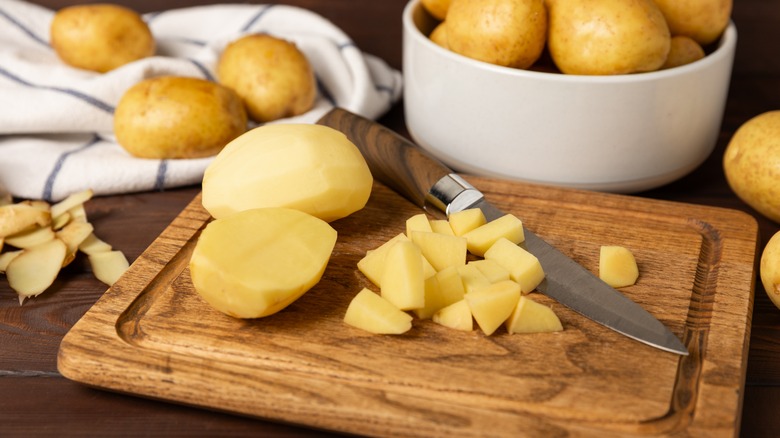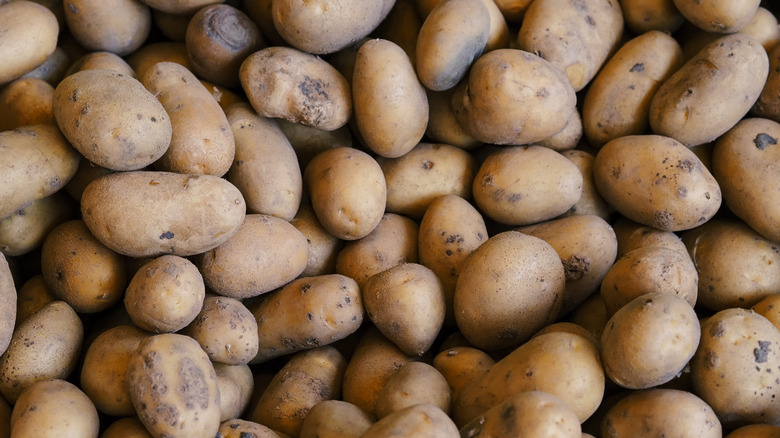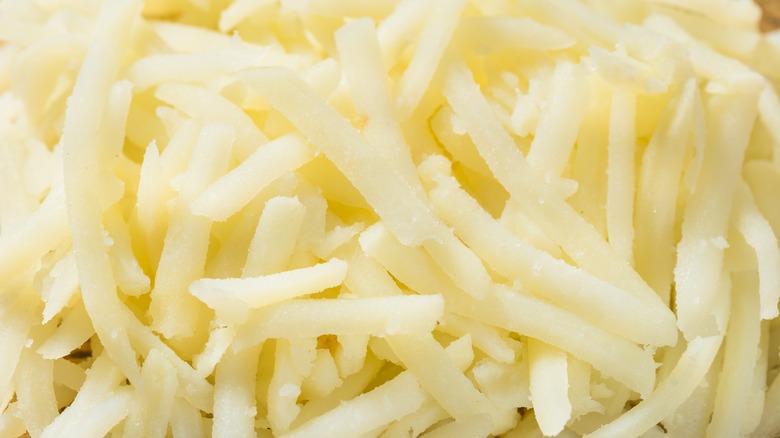Is It Ever Okay To Eat Raw Potatoes?
The potato is America's favorite vegetable. And it's unsurprising, really. They're the ultimate people's food — cheap, available almost everywhere, easy to cook and eat in a million and one different ways. Plus, they're delicious. Bake 'em, fry 'em, roast 'em, mash 'em. However you take yours, there's a potato for each one of us. But how many times have you been preparing some raw potatoes and thought, "I wonder what it would be like if I ate that little scrap of raw potato there?' Would it be good? Would it even be safe?"
Well, the answer is yes. And no. Raw potatoes are technically safe to eat in moderation, but they're not going to make you feel great. Raw potatoes are packed with resistant starch — a compound that forms a lot of gas when it breaks down in our stomachs, which can lead to bloating or flatulence. Potatoes are also high in substances called lectins, which are similarly undesirable when consumed in large quantities. Eating too many can cause nausea, vomiting, and other undesirable gastric events.
Even though you can eat raw potatoes — it's a wonder why anyone would. The super high resistant starch content means that raw potatoes have a chalky, floury texture and a bitter, generally unpleasant taste. So yes, you can eat your potatoes raw — in relatively small quantities — but beware of the unintended and often unpleasant consequences.
There are some surprising benefits to eating raw potatoes
It's not all bad, though. There are actually some profound health benefits that we can get from raw potatoes. Remember those resistant starches we mentioned earlier? Well, while it's true that in large quantities, they can cause some discomfort, they can actually have some remarkable health benefits if eaten in moderation. Some scientific studies have shown a positive effect on blood sugar levels, and sensitivity to insulin that leave us with a long-lasting full feeling which can stop us from over-eating! So, eating potatoes raw could actually prove beneficial to your gut health.
Raw potatoes are also high in butyrate, which can fight gut inflammation, bloating, and other symptoms of IBS. They're also considerably higher in vitamin C than their cooked counterparts (though they lack the same facilitation of absorbing those all-important vitamins). Vitamin C, in particular, is so much higher in raw potatoes due to its sensitivity to heat — which can destroy it entirely. That might well be the case, but the question remains: Though you technically can safely eat raw potato, why on earth would you want to?
Are raw potatoes good for anything?
In Chinese cuisine, there's an (almost) raw potato preparation that could be an upgrade from your basic potato salad recipe. They should know, being the country that produces the most potatoes. The secret lies in blanching the potatoes before letting them fully cool in an ice bath and mixing them with soy sauce, vinegar, aromatic oils, salt, and MSG. This doesn't fully cook the potatoes, but it does release that chalky texture and bitterness, leaving you with a delicious al-dente bite that's a novelty to most western palates. Though this isn't technically raw potato in the absolute sense, blanching is still more of a prep technique than actual cooking, so it's as close as we're going to get!
Of course, raw potato's use extends beyond just eating it — it can also be a handy tool for chefs and home cooks alike to have on hand. A single slice of raw potato can rescue an over-salted sauce or stock — drop it on a low heat for fifteen minutes and let it do its magic. Raw potatoes are super absorbent, so as they sit in the sauce, they will soak up all that excess salt — giving you the chance to pull back if you've gone a little far with it! Ultimately, though, if you've got a raw potato ... cook it!



